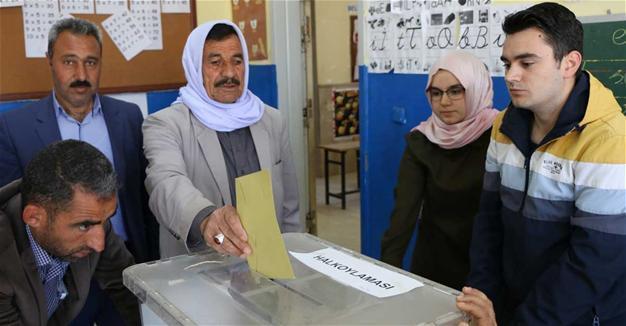Ruling AKP sees gains over HDP in southeastern provinces
Rifat Başaran - ANKARA

The ruling Justice and Development Party (AKP) saw an increase to its votes in Turkey’s southeastern provinces in the April 16 constitutional referendum, even though many provinces prevailed a majority “no” result.
Some 51.3 percent of the more than 58 million Turkish voters said “yes” to the constitutional amendment package in a tight race to decide on whether to shift to an executive presidential system.
While the AKP, President Recep Tayyip Erdoğan and the leadership of the Nationalist Movement Party (MHP) campaigned for a “yes” vote, main opposition Republican People’s Party (CHP), MHP dissidents and the Peoples’ Democratic Party (HDP) were on the “no” side.
The “yes” bloc saw an increase in its votes in the southeastern region, a stronghold of the Kurdish issue-focused HDP.
When the referendum results were compared with the Nov. 1, 2015, general elections, it was seen that the “yes” votes increased in the provinces that the HDP was a majority, prompting analysts to evaluate the situation as growing support for the AKP.
Five out of nine provinces in the southeast voted “no” in the referendum, while the participation in the referendum was determined as 83 percent.
In Gaziantep, the “yes” votes stood at 62.46 percent, while the total percentage of the AKP and MHP in the Nov. 1, 2015, elections was 71.2 percent, corresponding to an 8.74 percent loss to the “yes” camp.
In Diyarbakır, the total votes of the HDP and the CHP was 74.4 percent in previous elections, while in the referendum the “no” votes stood at 67.58 percent.
In Şanlıurfa, the support for the constitutional changes was 70.8 percent, corresponding to a 3.4 percent increase since the last elections.
Meanwhile, in Tunceli, there was a striking difference between the “yes” and “no” votes, with 80.42 percent of the electorate staunchly saying “no” to the constitutional changes.
The referendum results in trustee-appointed municipalities, meanwhile, showed decreases in the “no” camp compared to Nov. 1, 2015.
The Turkish Interior Ministry, since the November 2015 elections, had appointed trustees to 10 provinces, 63 districts and 12 towns over their alleged links to the outlawed Kurdistan Workers’ Party (PKK).
After the referendum results, Erdoğan pointed to the significance of votes in the eastern and southeastern regions.
“I especially want to point out to the significance of the votes in Eastern and Southeastern Anatolia. When we examine the results based on the stances of the parties during the referendum, we see an increase. This result will be the forerunner of a new era in our country,” Erdoğan said late on April 16.
 The ruling Justice and Development Party (AKP) saw an increase to its votes in Turkey’s southeastern provinces in the April 16 constitutional referendum, even though many provinces prevailed a majority “no” result.
The ruling Justice and Development Party (AKP) saw an increase to its votes in Turkey’s southeastern provinces in the April 16 constitutional referendum, even though many provinces prevailed a majority “no” result.